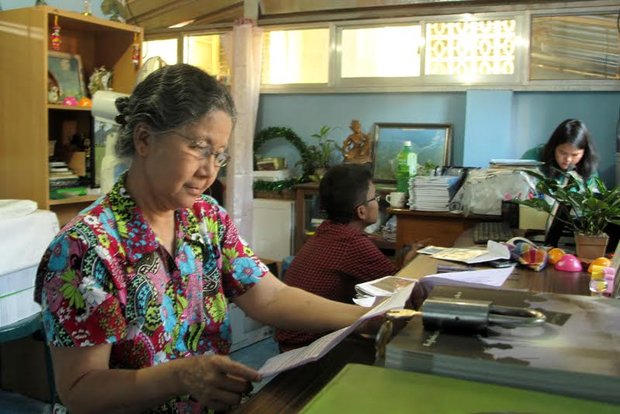Devi Thant Cin is a well-known environmentalist and coordinator of the Myanmar Green Network. The non-government organisation has been using the increasing space for civil society in Burma in recent years to lobby against environmentally damaging mega projects, such as the Myitsone hydropower dam on the Ayeyarwaddy River.
After President Thein Sein’s government announced plans to make coal-fired plants a major component of Burma’s expanding energy supply, Myanmar Green Network and other NGOs began campaigning against this policy. Local communities in several states and regions, in particular in Tanintharyi Region, have already protested against some projects fearing their heavy environmental impact.
Devi Thant Cin is not only known for being a leading environmentalist, but also as a princess and direct descendant of Burma’s last monarch King Thibaw.
In an interview with Myanmar Now, the 68-year-old discussed why she opposed coal plants and how a new National League for Democracy (NLD) government should prioritise alternative energy sources and create a Ministry of Environment.
Question: How do you plan to engage with the new government in order to lobby for environmental reform?
Answer: Myanmar Green Network has organised expert volunteers to support the government on environmental issues and we will present all of our findings. We independently conducted environmental impact surveys for the suspended Myitsone dam project, the China-backed Letpadaung copper mine and this issue of coal-fired power plants.
We presented our findings to President Thein Sein, National League for Democracy leader Aung San Suu Kyi, the 88 Generation Peace and Open Society and relevant ministries. Such surveys are the responsibilities of experts. In my opinion, any expert who does not point out faults in government plans betrays their country and people.
Q: Will you ask for the creation of an Environment Ministry that can carry out these plans? And why is that important?
A: Burma did not have a separate Ministry of Environment during the past 50 years. It was part of the Ministry of Environmental Conservation and Forestry.
Economy, health, education and politics are all related with environmental issues. For example, after onion prices increased more than eight times from 10 rupees to 88 rupees in India around 1980, the government of Prime Minister Indira Gandhi fell. In Egypt, when the prices of crops skyrocketed President Mubarak’s administration faced social problems. Global climate change is affecting the monsoon. Now, the monsoon is coming late and ending early. The situation is causing problems in agriculture-dependent countries … Therefore, green policies should be adopted in every country.
Q: What are the environmental consequences of coal-fired power plants?
A: Climate change may cause heavy rains or less rain (in part) due to gas emitted from coal-fired power plants. This will have negative impacts on the agriculture sector. Industrial emissions include dangerous chemicals such as lead and chromite. It can create diseases in lungs and heart, cause cancer and asthma. Excessive amounts of poisonous particles in the air will cause early death.
Q: Can you give an example of negative local consequences of coal plants?
A: There is a coal plant in Kalaw Township in southern Shan State. The local environment there has been damaged. Dark particles can be found in water storage facilities. The air is not clean. The rate of miscarriage is increasing in this area.
We are not protesting against every development project, but projects such as the Myitsone dam or coal-fired power plant project will create disadvantages for the country and its people.
Q: Are local communities aware of the consequences of coal plants?
A: Yes, they are. They get information from mining engineers and reading books. Public opinion is very important to stop this kind of projects.
Q: What are your plans to stop the use of coal for energy supply?
A: We will continue our activities. Although we have submitted our findings to the government, they proceeded with the (coal plant) projects. We have published our findings and educated the public. When people realise the impacts of these projects and call for an end to them, a democratic government should not continue them.
Q: Do you think a new government should break away from the Thein Sein government’s approach to coal?
A: Environmentalists do not accept the current government’s ‘clean coal technology’ (which is used in new plants). The Japanese government has admitted they cannot ensure there is actual ‘clean coal technology’. The United States has tried to create underground storage for carbon emitted from coal. However, even they could not afford it any more due to high costs. Meanwhile, Burma cannot even control bad smells emitted from ordinary factories, such as breweries and vermicelli factories, let alone coal plant emissions.
[related]
Q: But coal-fired plants are used in some countries. Why not here?
A: The use of coal in electricity generation or other business sectors is being reduced in other countries. Instead these economies are moving toward renewable energy sources, such as hydropower, solar and wind power, which have less impact on health and atmosphere.
Environmental conservation should be a major concern of global governments. Every country needs to adopt a ‘green policy’ for environmental conservation to protect the air, water and earth … In Burma, a separate ministry should be set up to conserve these resources.



